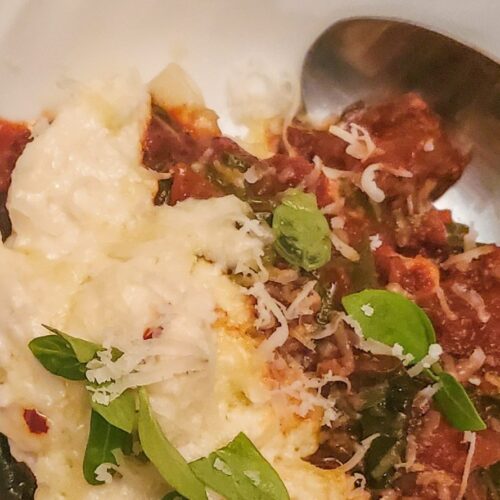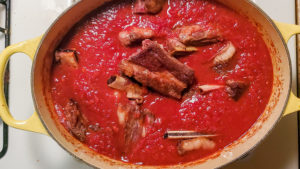
Red Wine Braised Short Rib Ragu with Swiss Chard and Pappardelle
Slow cooked short ribs in a tomato sauce peppered with fresh green swiss chard, served with wide, homemade pappardelle, a besciamella, and parmesan.
Ingredients
- 2.5-3 lbs Short Rib (I used Chuck for the fat element), seasoned with salt & pepper
- 2 cups Red Wine (Italian is a good idea)
- 1 large Sweet Onion, diced
- 2 carrots, Diced
- 1 stalk of Celery, diced
- 2 cloves of Garlic, minced
- 1 tbsp Tomato Paste
- 1.5 to 2 jars (24 ounce) Italian style Strained Tomatoes (Pomi, Mutti etc. -- less acidic than chopped tomatoes)
- 1 bunch of Swiss Chard
- Olive oil
- 8 tbsp Butter
- 4 Cups Milk
- 1/4 Cups Flour
- Pinch Nutmeg
- Salt / Pepper
- 1 Cups Parmigiano-Reggiano, plus more for serving
- fresh Basil
- 1 lb Pappardelle pasta (if wanting to go the route of homemade, see my Lasagna Post/recipe, which includes the ingredients and process of making your own.)
Instructions
- If preparing the pappardelle, do so and either freeze for the next day or dry out prior to making the Ragu. See above.
- Season the short ribs with salt and pepper. In a proper braising pot or ceramic one, heat about two tablespoons of olive oil over medium/high heat. Braise the short ribs for about five minutes on each side, making sure not to move around too much and allow a nice crust to form on both sides. Set aside.
- In the same pot, add a little more olive oil and a pat of butter, and saute the diced onion, carrot, and celery for about 10 minutes on a lower heat (adding a little salt for the onions). Add the minced garlic to the center of the pot (add more olive oil if need be) and give it about a minute. Add in the tomato paste.
- Turn the heat back up to nearly high and add the two cups of red wine. As the red wine bubbles, add the short ribs back in and allow the wine to permeate them as it reduces. After about 10 minutes, add in the tomato sauce, additional salt,pepper, and bay leaf if you have it (I was out to my chagrin). I also add about a cup of water to thin out the sauce a bit. Once boiling, lower the heat and simmer the Ragu for two hours, making sure to stir once in a while so, as you can guess, "the meat don't stick."
- While the Ragu is cooking, you can prepare the Besciamella. Just melt the butter in a saucepan over medium/low heat, then adding the flour and whisking until a thick paste forms. Slowly add in the milk while whisking vigorously for, unfortunately, 15 minutes. I did it in 10 this time. The sauce must thicken and the flavors must incorporate. During the last minute, I whisk in the Parmigiano so this Besciamella knows where it is heading. Let it cool completely and you can also refrigerate this for days, if you want to use it for all the many things it can make heavenly.

- Once the Ragu is done (but is it ever, really?), I slice the swiss chard into thin ribbons, each about three inches long at most, and mix it into the Ragu, allowing it to cook for an additional 15 minutes or so.
- Cook the Pappardelle in salty water for about 4-5 minutes. I usually cook fresh pasta for only a couple minutes, but here we remember that Pappardelle is more voluminous than spaghetti or macaroni, and we are not going to "finish" the pasta in the sauce.
- Dress the plate: A serving of long, varied lengths of pappardelle, a winter is coming heap of thick, red wine infused Ragu with Swiss Chard notes sticking out here and there, followed by a spoonful of the luscious besciamella, and topped with the delicate snowfall of additional Parmigiano, a few drizzles of olive oil, some lovely green pieces of fresh basil, and a red pepper flake or two, if you like.
Notes
 Nothing warms up a chilly night like this Ragu. It keeps and tastes even more ready to eat the next day.
Nothing warms up a chilly night like this Ragu. It keeps and tastes even more ready to eat the next day.